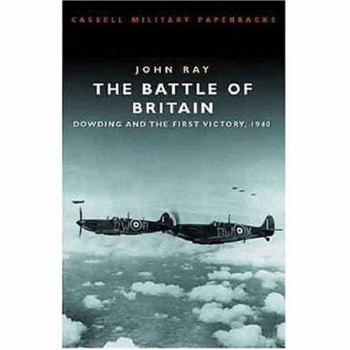The Battle of Britain: Dowding and the First Victory 1940
Select Format
Select Condition 
Book Overview
In the MILITARY PAPERBACKS series, this book, first published in 1994, examines the politics and strategies that set Hugh Dowding and the Air Ministry into terminal conflict and revealing the truth... This description may be from another edition of this product.
Format:Paperback
Language:English
ISBN:0304356778
ISBN13:9780304356775
Release Date:January 2001
Publisher:Cassell
Length:240 Pages
Weight:0.55 lbs.
Dimensions:0.7" x 5.1" x 7.8"
Related Subjects
Conventional England Europe History Ireland Military Weapons & Warfare World War IICustomer Reviews
2 ratings
Peeling away of the myths to explain the facts
Published by Thriftbooks.com User , 16 years ago
The Battle of Britain will always be an emotive event in UK history given it represented the tipping point for Churchill and the UK in surviving to fight on and for Hitler in attacking Russia after failing to extract a negotiated peace out of the UK. This well researched book is not about the battle per se but instead its leading figure Hugh Dowding, C in C of Fighter Command and the issue of command and leadership in the RAF that saw the personal style of the architect of the fighter strategy that had won the battle by September 1940 also lead to his dismissal in November 1940 for failing to respond to changed circumstances. The book's approach is chronological taking the key events from July to November 1940 but because of the sheer volumes of data and records to be covered, which can make for pretty dense reading at times, follows within each chapter an approach of interlocking sub chapters on the key issues and events in play in that specific period. Details of the actual fighting become largely peripheral with the emphasis being on how the RAF command structure including the Air Ministry and the War Cabinet under Churchill interacted. What makes the book so effective is its explanation and understanding of the different forces at play. As Dowding entered the Summer of 1940 he was facing constant attempts because of his age and period in position to be moved on, plus a reputation for being aloof as shown by his nickname "Stuffy". Yet despite this personal pressure together with his loyal No 2 Keith Park, in charge of No. 11 Group that took the main brunt of the battle, he was following a strategy he had developed and implemented over many years of the defensive use of limited fighter resources and an emphasis on stopping the bombers getting through. This caused unacceptable losses on a poorly executed German air offensive where the disconnection with ground forces that had existed under the prior successful blitzkriegs proved fatal. However this also replayed a long standing internal RAF conflict on differing views over bombers that had existed since pre-WWII, when Dowding had developed his views. This leads into the much debated Big Wing theory proposed in the summer by Douglas Bader and his No. 12 Group commander Leigh Mallory and never accepted as practically feasible at the time by Dowding or Park. The author shows how it has been both misunderstood and misinterpreted (plus relied on questionable data as to its potential success) but had in fact become largely irrelevant by Autumn 1940 with the move towards night bombing by the Luftwaffe. Alongside this Dowding's lack of effective leadership over the tension between Park and Leigh Mallory (who felt his resources were not being adequately used during the summer conflict) simply prepared the ground for others to attack his subsequent failure to understand and react in a convincing and pragmatic way as the levels of night bombing and high civilian casualties across the UK increased as t
A view of the battle from the inside looking out
Published by Thriftbooks.com User , 24 years ago
John Ray's book is in keeping with the excitement and suspense of other accounts of this fascinating battle (the only one in history to be fought completely in the air), but he takes the point of view of Britain's Sir Hugh Dowding, Commander-in-chief of RAF Fighter Command. Ray tells of the inner workings of the RAF, the political battles and clashes of personality that were happening as the battle was being fought and eventually won. It isn't a hagiography of Dowding, but defends his positions and points out his weaknesses. The details on the battle are given as they relate to Dowding's story, without a rigid historical chronology, but containing some terrific anecdotes (such as Dowding's visit to the French Armie de L'Aire headquarters in March of 1940, which helped him make up his mind not to send any more of his fighters to be destroyed in what was obviously a lost cause.This is a book for those who already know the Battle of Britain and wish to delve deeper into the personalities involed, rather than a complete record of events during the Summer of 1940. It is an intellectual and entertaining look at the Battle from behind the desk of its most tenacious leader.





